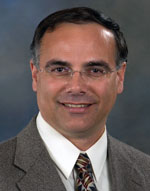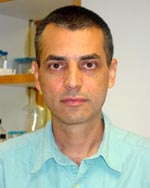Adam Kuspa, Ph.D.
Biochemistry & Molecular Biology

Gad Shaulsky, Ph.D.
Molecular & Human Genetics

Drs. Shaulsky and Kuspa have extended their earlier work on the evolution of the soil amoeba Dictyostelium discoideum and related it to the field of social evolution. In times of starvation, the free-living Dicty cells merge into multicellular organisms made up of a non-reproductive stalk and spores. The spores give rise to the next generation, whereas stalk cells die in an altruistic process benefitting the spores. In most cases, the contributions to stalk and spore are in proportion to the populations of dicty cells that form the organisms. However, the existence of "cheater" cells has been known since 2000. "Cheaters" produce spores but do not contribute to the stalk, and it was previously thought that their spread was limited by such factors as developmental defects. However, Shaulsky and Kuspa found over 100 mutations in cheaters demonstrating that the genetic possibility of - cheating - in the system is great and without an evident cost.
Drs. Shaulsky and Kuspa followed up this work with studies on the mechanisms by which natural populations may resist cheaters. They found "cheater-resistant" mutants that can protect other dicty cells from those that cheat. Moreover, these mutants were noble, not using their resistance to exploit other strains but even at times protecting others from the cheater. In a third finding, Drs. Shaulsky and Kuspa found that dicty have a form of immune system that can help them discriminate "self" from "nonself", segregating different strains of the organisms as kin and non-kin. This finding suggests that self-recognition may have evolved as a response to social cheaters.
Drs. Shaulsky and Kuspa's nomination was based on the following publications:
Santorelli, L.A., Thompson, C.R., Villegas, E., Svetz, J., Dinh, C., Parikh, A.,
Sucgang, R., Kuspa, A., Strassmann, J.E., Queller, D.C., Shaulsky, G. (2008)" Facultative
cheater mutants reveal the genetic complexity of cooperation in social amoebae
". Nature , (451), 1107-1110.
Khare, A., Santorelli, LA., Strassmann, J.E., Queller, D.C., Kuspa, A., & Shaulsky,
G. (2009) "
"Cheater resistance is not futile" ". Nature (7266), 980-982.
B Benabentos, R., Hirose, S., Sucgang, R., Curk, T., Katoh, M., Ostrowski, E.A.,
Strassman, J.E., Queller, D.C., Zupan, B., Shaulsky, G., & Kuspa, A. (2009) " Polymorphic
members of the lag gene family mediate kin discrimination in Dictyostelium.".
Curr Biol, 19(7), 567-572.
